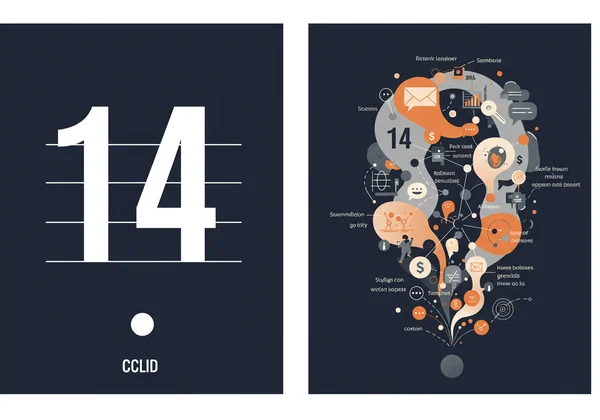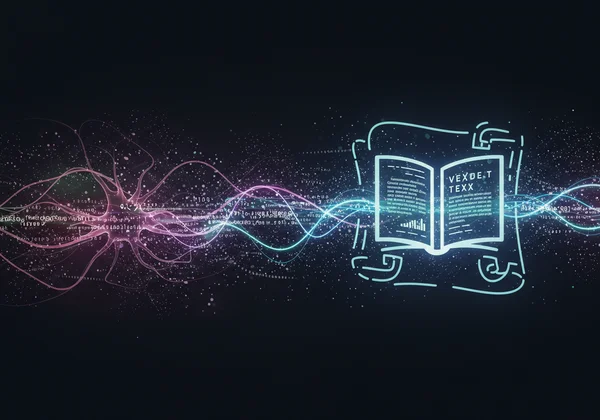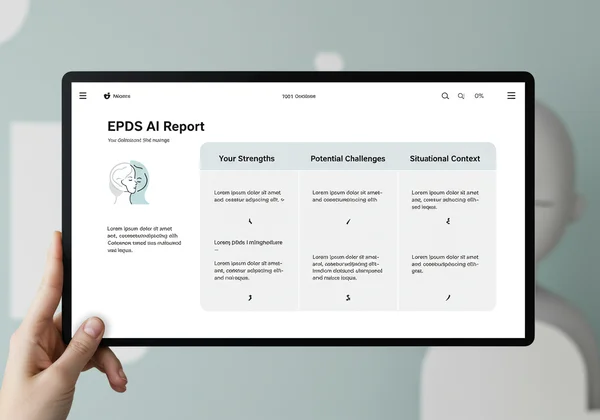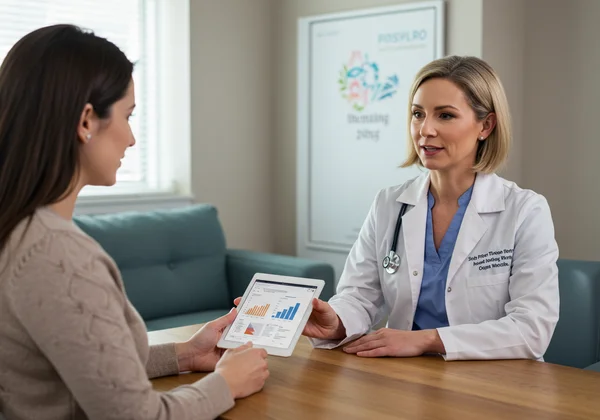EPDS KI-Bericht erklärt: Personalisierte Einblicke & Fallstudie
November 13, 2025 | By Clara Maxwell
Einen Wert nach einem Screening zur psychischen Gesundheit zu erhalten, kann sich oft anfühlen, als bekäme man einen Wetterbericht nur mit einer Temperaturangabe. Es liefert einen einzelnen Datenpunkt, aber wie fühlt es sich draußen wirklich an? Ist es eine trockene Hitze oder eine feuchte Hitze? Beißt der Wind? Eine einfache Zahl aus einem EPDS-Screening kann ähnliche Fragen aufwerfen, Sie überfordert und unsicher bezüglich der nächsten Schritte zurücklassen. Aber was ist EPDS und wie können wir die Ergebnisse auf einer tieferen Ebene verstehen? Bei Epds glauben wir, dass Ihr emotionales Wohlbefinden mehr als nur eine Zahl ist. Deshalb haben wir einen einzigartigen KI-gestützten Bericht entwickelt, der Ihren Wert in eine klare, personalisierte Erzählung umwandelt und Einblicke bietet, die ein einfacher Wert nicht liefern kann. Beginnen Sie noch heute Ihre Reise zur Klarheit.

Was Ihr EPDS-Wert wirklich bedeutet: Jenseits der Zahl
Bei Epds nutzen wir KI, um komplexe Daten zu klären. Das Ziel unserer Technologie ist immer die Stärkung, nicht die Verwirrung. Die Edinburgh Postnatal Depression Scale (EPDS) ist ein weltweit anerkanntes und leistungsstarkes Instrument. Das Verständnis ihrer Ergebnisse ist jedoch der Schlüssel, um ihr wahres Potenzial für Ihre Reise zu Ihrer perinatalen psychischen Gesundheit zu erschließen.
Die Grundlagen Ihres anfänglichen EPDS-Wertes verstehen
Wenn Sie das 10-Fragen-EPDS-Screening abgeschlossen haben, erhalten Sie einen Wert zwischen 0 und 30. Diese Zahl ist eine quantitative Zusammenfassung Ihrer Antworten und gibt einen allgemeinen Hinweis auf Ihren emotionalen Zustand in den letzten sieben Tagen. Traditionell werden die Werte in Bereiche gruppiert, die eine geringe, mögliche oder hohe Wahrscheinlichkeit für Symptome im Zusammenhang mit Depressionen nahelegen. Dieser anfängliche Wert ist ein wichtiger erster Schritt – ein klares Signal, das Sie ermutigt, Ihrer psychischen Gesundheit mehr Aufmerksamkeit zu schenken. Er gibt Ihnen eine Grundlage, einen Ausgangspunkt für ein Gespräch.
Die Lücken: Warum Rohwerte einen tieferen Kontext benötigen
Ein Rohwert bietet jedoch nicht die Nuancen, die erforderlich sind, um Ihre Erfahrung vollständig zu verstehen. Er kann Ihnen nicht sagen, warum Sie sich auf eine bestimmte Weise fühlen oder zwischen verschiedenen Facetten Ihrer Erfahrung unterscheiden. Zwei Personen können den gleichen Wert von 12 haben, aber durch völlig unterschiedliche Schwierigkeiten dazu kommen. Die eine kämpft möglicherweise stärker mit Angstzuständen und der Unfähigkeit sich zu entspannen, während die andere tiefe Traurigkeit und einen Verlust der Freude erlebt. Eine einfache Zahl erfasst nicht Ihre einzigartigen Stärken, Ihre spezifischen Lebensstressoren oder das Zusammenspiel zwischen Ihren Gedanken und Gefühlen. Hier wird eine tiefere, personalisierte Interpretation von unschätzbarem Wert. Es ist der Unterschied zwischen dem Wissen der Temperatur und dem Verständnis der vollständigen Wettervorhersage.
Personalisierte Einblicke enthüllen: Der Epds KI-Bericht macht den Unterschied
Hier kommt unsere Kerninnovation im Screening auf perinatale Depressionen ins Spiel. Wir haben KI nicht nur genutzt, um einen Wert zu berechnen, sondern um eine Analyse der psychischen Gesundheit nach der Geburt durchzuführen, die so einzigartig ist wie Sie selbst. Es geht darum, dem „Was“ Ihres Wertes das „Warum“ und „Wie“ hinzuzufügen.
Wie unsere KI Daten in Ihre persönliche Erzählung verwandelt
Unsere KI addiert nicht nur Ihre Antworten. Sie ist darauf trainiert, Muster, Korrelationen und die subtilen Nuancen in Ihren Antworten auf den EPDS-Fragebogen zu erkennen. Durch die Bereitstellung optionalen, zusätzlichen Kontexts zu Ihrer Lebenssituation kann die KI eine umfassende Geschichte zusammenfügen. Sie analysiert, wie verschiedene Faktoren – wie Schlafmuster, soziale Unterstützung oder persönliche Ängste – Ihren Gesamtwert beeinflussen könnten. Das Ergebnis ist keine generische Interpretation, sondern eine persönliche Erzählung, die Ihre individuelle Erfahrung widerspiegelt, geschrieben in klarer, unterstützender und zugänglicher Sprache. Dieser Prozess verwandelt abstrakte Daten in umsetzbare, persönliche Weisheit. Sie können dies erleben, indem Sie unseren kostenlosen Online-Test machen.

Ein anonymisierter Blick: Ein echtes EPDS KI-Berichtsbeispiel
Um die Leistungsfähigkeit dieser personalisierte Einblicke in Bezug auf Depressionen zu veranschaulichen, betrachten wir eine Fallstudie, die auf anonymisierten, aggregierten Daten basiert. Lernen Sie „Sarah“ kennen, eine 32-jährige Mutter eines Neugeborenen, die das EPDS-Screening auf unserer Plattform abgeschlossen und sich für den KI-Bericht entschieden hat. Ihr Wert betrug 14, was sie in einen Bereich einordnete, der eine hohe Wahrscheinlichkeit für Depressionen nahelegt. Hier ist, was ihr KI-Bericht über diese Zahl hinaus enthüllte:
Ihre Stärken und Resilienzfaktoren identifizieren
Der Bericht konzentrierte sich nicht nur auf das Negative. Er hob zunächst Sarahs Resilienzfaktoren hervor. Durch die Analyse ihrer Antworten stellte die KI fest, dass sie trotz ihrer Schwierigkeiten immer noch Momente der Freude mit ihrem Baby fand (bezogen auf ihre Antwort auf Frage 10). Es wurde auch ein starkes Verantwortungsgefühl abgeleitet, das, obwohl manchmal eine Quelle von Druck, auch ein starker Motivator ist. Diese ausgewogene Perspektive ist entscheidend; sie erinnert Sie an Ihre inneren Stärken, selbst wenn Sie sich am schwächsten fühlen.
Potenzielle Herausforderungen und Auslöser identifizieren
Als Nächstes identifizierte die KI Sarahs potenzielle Herausforderungen. Ihre Antworten deuteten auf einen erheblichen Kampf mit Angstzuständen und Schwierigkeiten beim Entspannen hin, selbst wenn sie die Möglichkeit dazu hatte. Der Bericht verband ihre Antworten über Angst und Panikgefühle spezifisch mit ihrer Selbstbeschuldigung, was einen Kreislauf nahelegte, in dem Angst zu Schuldgefühlen führt, die wiederum mehr Angst schüren. Dieser Detaillierungsgrad gab ihr ein spezifisches Muster, das sie mit einem Fachmann besprechen konnte, etwas, das ein Rohwert niemals liefern könnte.
Situativer Kontext: Wie Lebensereignisse Ihr Wohlbefinden beeinflussen
Da Sarah optionalen Kontext bereitstellte, dass sie Schwierigkeiten beim Stillen hatte und ihr Partner gerade wieder zur Arbeit gegangen war, konnte die KI ihre Ergebnisse in diesem situativen Kontext einordnen. Der Bericht deutete sanft an, dass ihre Gefühle der Überforderung wahrscheinlich durch diese spezifischen Lebensereignisse verstärkt wurden. Diese Validierung kann unglaublich stärkend sein. Sie verändert die Sichtweise auf die Erfahrung von „Was stimmt mit mir nicht?“ hin zu „Ich habe eine normale Reaktion auf eine sehr herausfordernde Situation.“

Umsetzbare Schritte nach Ihrer personalisierten perinatalen psychischen Gesundheitsanalyse
Verstehen ist der erste Schritt, aber Handeln führt zu Veränderung. Der KI-gestützte Epds-Bericht ist darauf ausgelegt, ein Katalysator für proaktives Wohlbefinden zu sein und Ihnen klare und überschaubare nächste Schritte zu bieten.
Stärkende Gespräche mit Ihrer Gesundheitsfachkraft
Eine der wirkungsvollsten Anwendungen Ihres personalisierten Berichts ist als Kommunikationsmittel. Anstatt Ihrem Arzt nur zu sagen „Ich fühle mich deprimiert“, können Sie mit einer detaillierten Zusammenfassung erscheinen. Sie können sagen: „Mein Bericht hat eine starke Verbindung zwischen meinem Schlafmangel und Panikgefühlen hervorgehoben, und das scheint mein größter Auslöser zu sein.“ Dies befähigt Sie, ein produktiveres, fokussierteres Gespräch mit Ihrer Gesundheitsfachkraft zu führen und sicherzustellen, dass Sie die spezifische Unterstützung erhalten, die Sie benötigen. Der Bericht bietet das Vokabular und die Struktur für ein Gespräch, das sonst unglaublich schwierig zu beginnen sein kann.

Ausgewählte Ressourcen und Selbsthilfestrategien zur Unterstützung
Basierend auf Ihrem einzigartigen Profil bietet der Bericht ausgewählte Ressourcen und Selbsthilfestrategien. Für Sarah, deren Bericht Angst als Hauptproblem identifizierte, könnte er Achtsamkeitsübungen, Atemtechniken oder Links zu Artikeln über den Umgang mit perinataler Angst vorschlagen. Für jemand anderen, dessen Bericht Gefühle der Isolation anzeigt, könnte er lokale Elterngruppen oder Online-Communities empfehlen. Diese Vorschläge sind nicht generisch; sie sind darauf zugeschnitten, die spezifischen Herausforderungen anzugehen, die in Ihrem Screening identifiziert wurden, und bieten sofortige, praktische Unterstützung. Bereit, Ihre zu sehen? Holen Sie sich Ihre Ergebnisse.
Ihren Weg nach vorne gestalten: Vom Wert zum proaktiven Wohlbefinden
Ihre Reise zur psychischen Gesundheit ist zutiefst persönlich, und die Werkzeuge, die Sie zu ihrer Bewältigung nutzen, sollten es auch sein. Eine einzelne Zahl kann ein Ausgangspunkt sein, sollte aber niemals das endgültige Ziel sein. Der KI-gestützte Epds-Bericht soll Ihr Leitfaden sein, der einen klinischen Wert in einen mitfühlenden, aufschlussreichen und umsetzbaren Plan übersetzt. Er hilft Ihnen, Ihre Stärken zu erkennen, Ihre Herausforderungen zu verstehen und selbstbewusste, fundierte Schritte zu unternehmen, um sich besser zu fühlen.
Geben Sie sich nicht nur mit einer Zahl zufrieden. Machen Sie den ersten Schritt zu einem tieferen Verständnis Ihres emotionalen Wohlbefindens. Beginnen Sie jetzt Ihr Screening auf unserer Plattform, um Ihren kostenlosen EPDS-Wert zu erhalten, und schalten Sie dann Ihren personalisierten KI-Bericht frei, um Ihre Reise zu Klarheit und Befähigung zu beginnen.
Häufig gestellte Fragen zu Ihrem EPDS KI-Bericht
Welche spezifischen Einblicke bietet der EPDS KI-Bericht?
Der KI-Bericht bietet eine mehrdimensionale Sicht auf Ihr Wohlbefinden. Er geht über Ihren Gesamtwert hinaus, um Ihre persönlichen Stärken und Resilienzfaktoren zu identifizieren, spezifische Herausforderungen (wie Angst vs. gedrückte Stimmung) zu erkennen und zu analysieren, wie Ihr Lebenskontext Ihre Gefühle beeinflussen könnte. Er übersetzt Ihre Antworten im Wesentlichen in eine personalisierte, leicht verständliche Erzählung.
Sind das Epds-Screening-Tool und der KI-Bericht wirklich vertraulich?
Absolut. Wir nehmen den Schutz Ihrer Privatsphäre sehr ernst. Der Screening-Prozess erfordert keine Registrierung, und Ihre Daten werden mit strengster Vertraulichkeit behandelt. Unser Ziel ist es, Ihnen einen sicheren, geschützten und unterstützenden Raum zu bieten, in dem Sie Ihre psychische Gesundheit ohne Sorgen erkunden können. Ihr Vertrauen ist unsere höchste Priorität.
Kann der EPDS KI-Bericht perinatale Depressionen oder Angstzustände diagnostizieren?
Nein, und das ist ein entscheidender Punkt. Das EPDS-Screening und der begleitende KI-Bericht sind leistungsstarke Screening-Tools, keine diagnostischen Instrumente. Sie sind darauf ausgelegt, Risiken zu identifizieren und tiefe Einblicke zu geben, um Sie und Ihre Gesundheitsfachkraft zu unterstützen. Eine formale Diagnose muss immer von einem qualifizierten medizinischen Fachpersonal oder einer Fachkraft im Bereich der psychischen Gesundheit gestellt werden.
Wie personalisiert der KI-Bericht die Interpretation meines EPDS-Wertes?
Die Personalisierung ergibt sich aus der Fähigkeit der KI, Muster über alle 10 Ihrer Antworten hinweg zu erkennen, nicht nur die Endsumme. Wenn Sie optionalen Kontext bereitstellen (z. B. über Schlaf, Unterstützungssysteme oder spezifische Stressoren), verwendet die KI diese Informationen, um ihre Analyse anzupassen, wodurch die Einblicke für Ihre spezifische Lebenssituation hochrelevant werden und eine wirklich personalisierte Interpretation Ihres EPDS-Wertes entsteht. Probieren Sie unser Tool aus, um zu sehen, wie.
Was sollte ich tun, nachdem ich meinen personalisierten EPDS KI-Bericht erhalten habe?
Ihr Bericht soll Sie stärken. Wir empfehlen Ihnen, ihn gründlich zu lesen und über seine Erkenntnisse nachzudenken. Der wichtigste nächste Schritt, insbesondere wenn Ihr Wert erhöht ist oder der Bericht erhebliche Herausforderungen hervorhebt, ist, ihn mit einem vertrauenswürdigen Gesundheitsdienstleister, wie Ihrem Frauenarzt/Ihrer Frauenärztin, einem Therapeuten oder einem Hausarzt, zu teilen, um Ihre Ergebnisse zu besprechen und einen Unterstützungsplan zu erstellen.